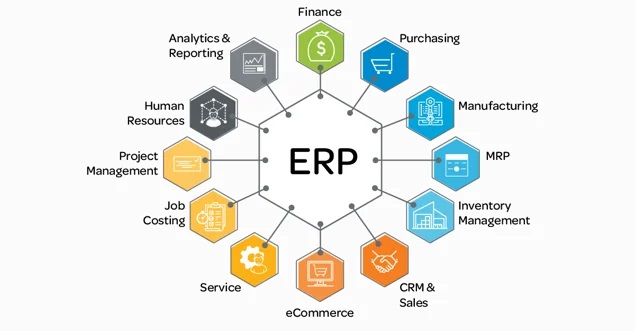Companies operating in any industry must have sound financial planning if they hope to expand. There are many apps available on the market right now to assist businesses in managing their accounts and transactions. One of the most widely used accounting software programs worldwide is QuickBooks. But there are other business operations that are crucial for organizations besides accounting. Applications for enterprise resource planning, or ERP, are useful in this situation.
Dancing Numbers helps small businesses, entrepreneurs, and CPAs to do smart transferring of data to and from QuickBooks Desktop. Utilize import, export, and delete services of Dancing Numbers software.
To assist you in making the QuickBooks vs. ERP decision, this article offers a thorough guide. You will examine the main attributes of ERP and QuickBooks. Additionally, the primary characteristics that set apart these two platforms will be explained to you. You will ultimately be able to select the ideal platform for your needs as a business. Let’s go ahead and begin.
Introduction to QuickBooks

The accounting software QuickBooks, produced by the American software company Intuit, is the most popular in the world. With its many features and tools, the application can meet any accounting or financial need that a business may have. People without any experience in accounting can easily use the platform thanks to its simple and intuitive interface.
Companies can use QuickBooks without installing any specialized infrastructure at their workstations because it is a cloud-based application. QuickBooks automatically updates to the most recent version, saving users a tone of time, and all uploaded data is stored on secure cloud servers.
QuickBooks includes features like Payroll Management in addition to its core accounting functions to assist users in managing different aspects of their businesses. Businesses can use QuickBooks to track their sales status because it has many features, including customer information management, sales reporting, inventory tracking, and more. Businesses of all sizes can use QuickBooks, a powerful accounting program.
QuickBooks enables businesses to link numerous bank accounts in order to track their transactions. QuickBooks will automatically download historical transaction records and arrange them in the appropriate order once bank accounts are connected to the program. Additionally, users can track and manage their accounts from anywhere in the world with its smartphone application, which is compatible with both iOS and Android. QuickBooks is now much more accessible thanks to the smartphone app.
To assist businesses in more effectively analyzing their business performance, QuickBooks provides an intuitive and clear unified dashboard that presents all the necessary information, including budget, total sales, total expenses, and many more, on a single screen. With its headquarters located in Arizona, the business was established in 1983 by Scott Cook and Tom Prolix. Over 4 million businesses worldwide use QuickBooks, making up a sizable customer base.
Key Features of QuickBooks
With its many features, QuickBooks, the most widely used accounting and bookkeeping software, assists businesses in managing their money. A few of QuickBooks’s notable features are listed below:
Increase in Invoices
When businesses use QuickBooks, raising invoices becomes a simple task. Businesses can create invoices that look professional and send them to clients via email and SMS with the Accounting application. Numerous pre-built invoice templates are included with QuickBooks, which businesses can modify to fit their branding. Additionally, it enables businesses to expedite the payment collection process by directly attaching bank transfer and payment gateway links in invoices.
Cost Control
Businesses can easily track and manage every expense associated with their business with QuickBooks. It helps users manage their finances by providing important metrics such as total sales, total expenses, total income, and tax segregation. The QuickBooks mobile app allows users to snap pictures of receipts, and the program instantly associates the image with a transaction that has already occurred. Businesses can save a significant amount of employee effort and productive time thanks to this feature.
Introduction to ERP (Enterprise Resource Planning)

Software known as enterprise resource planning is used by businesses of all sizes to integrate and optimize a variety of business operations, such as finance and human resources. Supply chain management and various operations can be automated with the help of ERP solutions that are currently on the market.
ERP systems offer features and tools to help businesses manage their manufacturing, sales, and marketing requirements in addition to finance and HR (human resource) tasks. Currently on the market, some of the most popular ERP programs are SAP, Sage Business, Infor Syteline, JD Edward EnterpriseOne, Microsoft Dynamics 654, Oracle NetSuite, and SYS Pro. Every company can benefit from the application’s suitability by simply configuring the available EPR software to meet their diverse business needs.
ERP applications are now widely used by the majority of prosperous businesses worldwide to efficiently manage their daily operations. The capabilities and resources provided by ERP programs also produce significant insights that support businesses in planning their future operations.
Key Features of ERP
Enterprise resource planning software offers a plethora of features that assist organizations in optimizing and streamlining various business processes. Here are some noteworthy features that ERP applications offer.
Relationship Management for Customers
ERP platforms have robust CRM tools built in to support businesses in communicating with clients in an efficient manner. Critical data like Order History, Prospect Status, Customer Contacts, and many more are displayed by tools in ERP applications. Additionally, it can automate a number of CRM functions, including creating accounts receivable, sending notifications, creating personalized reminders, and performing other relevant tasks.
Human Resource Administration
Some features for improved HRM are available in the majority of ERP software packages. With ERP software, businesses can use a variety of HR-related tasks, such as hiring and scheduling employees, to be automated. These features all assist businesses in maximizing internal communication and task distribution, which significantly raises employee productivity.
ERP software includes a Payroll Management system in addition to HR tools. This system can be used to automate tasks such as calculating salaries, deducting money from salaries, recording employee attendance, and other important tasks. Businesses can save the human resources department a great deal of productive time and effort by utilizing the Payroll Management feature.
Marketing and Sales Administration
All of the main sales and marketing tasks, such as managing marketing campaigns and sales forecasting, can be completed by businesses using ERP software. Sales prediction figures are displayed by ERP applications based on historical sales records and available customer history. This feature assists businesses in evaluating their operations and assisting in the formulation of more intelligent sales and marketing strategies. Additionally, it offers businesses a Point of Sale (POS) function that enables them to sell their goods to clients in person.
Factors Influencing the Decision between ERP and QuickBooks
Applications for ERP and QuickBooks both offer comparable features and resources to help businesses run their day-to-day operations efficiently. But, there isn’t a one-size-fits-all solution; instead, you have to base your decision on the requirements of your business, your financial situation, and other elements when deciding between QuickBooks and ERP. The following are the main determinants of the QuickBooks vs. ERP comparison:
Purpose of QuickBooks Vs. ERP

QuickBooks is an all-inclusive accounting and bookkeeping software that meets all of the needs of businesses regarding financial monitoring. Small and medium-sized businesses are QuickBooks’ main target market, despite the fact that businesses of all sizes can use the platform.
ERP software, on the other hand, is a tool for business optimization that is utilized by organizations that engage in a variety of business activities. It provides functions for managing a wide range of tasks, including payroll, accounting, audits, customer relationship management, sales, and marketing. Large-scale businesses that need to manage a wide range of business operations are better suited for it.
Team Size of QuickBooks Vs. ERP

ERP applications are a better choice for a company if it plans to hire a large number of new employees or has a large team. ERP programs enable greater accessibility and can manage a larger user base, both of which boost worker productivity. Conversely, QuickBooks is the ideal option for businesses with a small workforce.
Setting of QuickBooks Vs. ERP
The majority of ERP apps on the market today provide sophisticated tools and features for a variety of business functions. For businesses to get the most out of the software, it is therefore imperative that staff members receive proper training. By contrast, QuickBooks has an extremely intuitive interface that even novice users can easily learn how to use. Businesses that use QuickBooks can save a significant amount of time when onboarding new staff.
QuickBooks vs ERP: Ease of Use

Most ERP programs on the market include advanced features and tools for a variety of business processes. Hence, to get the most out of the program, businesses must ensure that their staff members receive proper training. On the other hand, QuickBooks has an extremely intuitive user interface that even new users may quickly grasp. Using QuickBooks can help businesses save a sufficient amount of time when onboarding new staff.
Pricing of QuickBooks Vs. ERP

A higher market segment is targeted by the majority of ERP software prices. Consequently, not every business can afford them. ERP programs are a viable option for enterprises with a large workforce and a range of business requirements in order to run their operations efficiently.
However, for small and medium-sized businesses in particular, QuickBooks offers reasonably priced monthly subscription plans. EasyStart, Essential, and Plus are the three subscription plans that QuickBooks provides to its users. Starting at $20 per month, the price increases to $60 per month. In addition to basic subscriptions, QuickBooks offers hundreds of third-party integrations-both free and paid-through its app store, which can be used to expand the Accounting platform’s functionality.
Conclusion
A thorough comparison of QuickBooks and ERP was provided in this article. You now have a better understanding of the main characteristics of QuickBooks vs. ERP. Now that you know which of the two is best for your needs and business goals, you can make that decision.
In summary, both the ERP and QuickBooks programs are strong, useful programs that are simple to set up on workstations. All businesses, however, have distinct needs, so it is imperative that organizations carefully select the appropriate application. QuickBooks is unquestionably a great option for managing finances for businesses that need a powerful accounting program but have a small staff. When working on ERP applications, large businesses with numerous business operations will also have a significant advantage.

Looking for a professional expert to get the right assistance for your problems? Here, we have a team of professional and experienced team members to fix your technical, functional, data transfer, installation, update, upgrade, or data migrations errors. We are here at Dancing Numbers available to assist you with all your queries. To fix these queries you can get in touch with us via a toll-free number
+1-800-596-0806 or chat with experts.
Frequently Asked Questions
Can an ERP System be used with QuickBooks?
Since accounting functions are only one of an ERP system’s many features, QuickBooks is not an ERP. Inventory management, production, sales and marketing, procurement, and other business processes are just a few of the many tasks that ERP systems assist companies with managing.
Is CRM and QuickBooks same?
Small businesses that use QuickBooks accounting software and need a dependable method to monitor their customer relationships should consider investing in a CRM.
Does QuickBooks Function as a Platform for CRMs?
As QuickBooks keeps track of customer contacts and purchase histories, small businesses frequently use it as their first CRM. Additionally, it may be sufficient to have access to client contact information from your accounting software when your business is just getting started.
What Kind of Software does QuickBooks Belong to?
Complete with tools for accounting, inventory, payroll, tax filing, bank account tracking and reconciliation, invoicing, expense management, budgeting, payment processing, and accounts receivable and payable management, QuickBooks is a feature-rich suite for business and financial management.
What uses Does QuickBooks Serve?
QuickBooks makes it easy to manage your finances in real-time, including income and expenses, employee spending, inventory, and tax obligations. You can concentrate on accelerating business growth and revenue when you are worry-free financially.


 +1-800-596-0806
+1-800-596-0806